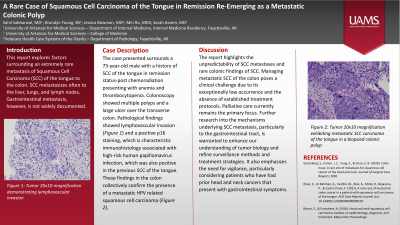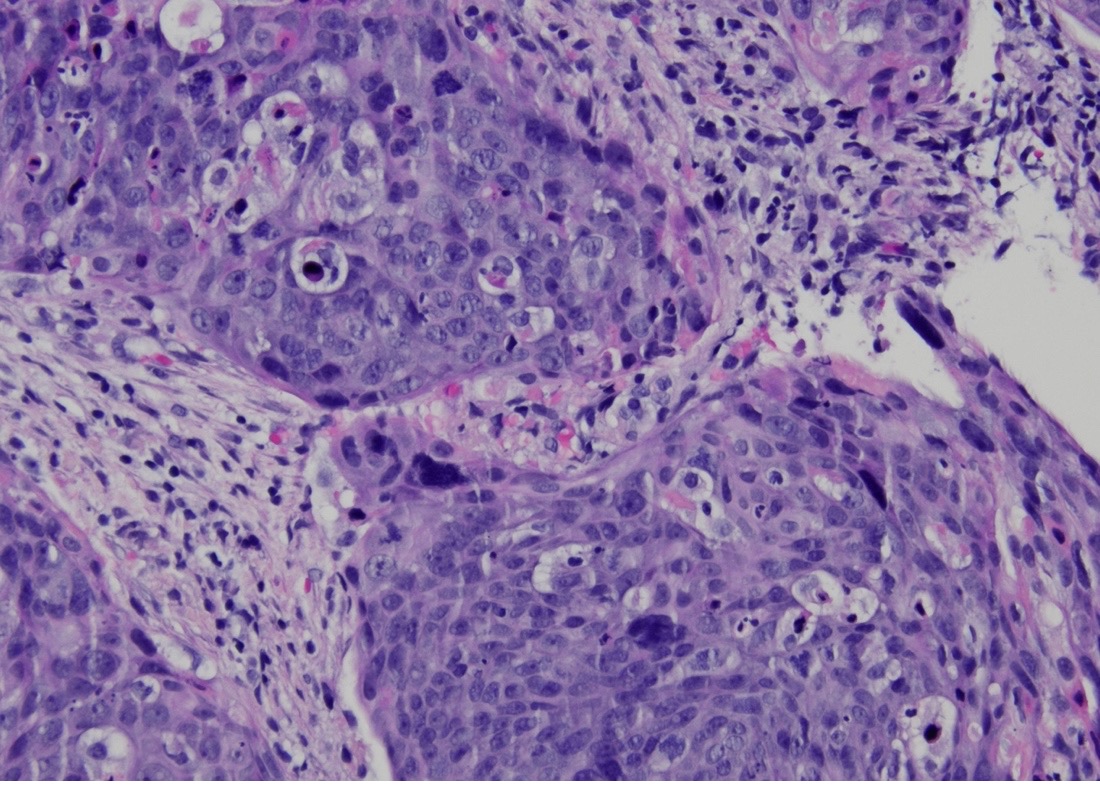Tuesday Poster Session
Category: Colon
P3761 - A Rare Case of Squamous Cell Carcinoma of the Tongue in Remission Re-Emerging as a Metastatic Colonic Polyp
Tuesday, October 29, 2024
10:30 AM - 4:00 PM ET
Location: Exhibit Hall E

Has Audio

Sahil Sabharwal, MD
University of Arkansas for Medical Sciences
Fayetteville, AR
Presenting Author(s)
Sahil Sabharwal, MD, Brandyn Young, BS, Simon Meykler, DO, Jessica Bowman, MD, Sarah Assem, MD
University of Arkansas for Medical Sciences, Fayetteville, AR
Introduction: Squamous Cell Carcinoma of the Tongue (SCC) is a malignancy characterized by its aggressive nature, primarily affecting the squamous epithelial cells of the oral mucosa. It is associated with various risk factors, including smoking, alcohol consumption, and human papillomavirus (HPV). SCC is notorious for its high recurrence rates and propensity to metastasize to distant sites, such as the lungs, liver and lymph nodes, often through infiltration of neighboring tissues and vascular channels. Metastasis to the gastrointestinal (GI) tract is infrequent and remains poorly documented.
Case Description/Methods: The patient is a 75-year-old man presenting with a nine month history of unexplained anemia and thrombocytopenia. He has a history of SCC of the tongue treated with chemoradiation. Previous pathology revealed the presence of poorly differentiated squamous cell carcinoma of the tongue with positive p16 staining, indicative of HPV infection.
During a colonoscopy, multiple polyps were excised. Biopsy revealed that at least one of the polyps was malignant and consistent with metastasis from the previously diagnosed SCC of the tongue (figure 1). Immunohistochemical staining was positive for p40 and weakly positive for CK7, while CK20 and CDX2 were negative. Notably, p16 staining displayed diffuse block positivity, consistent with high-risk HPV infection. These findings collectively confirm the presence of a metastatic HPV-related squamous cell carcinoma.
Discussion: This case underscores the unpredictable nature of SCC metastasis and the infrequent incidence of colonic metastasis originating from SCC of the tongue.
The mechanisms underlying the metastasis of SCC to the colon likely entails hematogenous dissemination, as there are no direct anatomical pathways between the primary and metastatic sites. This is supported by the presence of p16 staining in both the primary and metastatic lesions, suggesting a high-risk pathogenesis in HPV patients.
Managing metastatic SCC of the colon poses a clinical challenge due to its low occurrence and the absence of established treatment protocols. Current management emphasizes palliative care as curative options are limited.
Patients who have undergone treatment for SCC may find value in regular follow-up appointments, which evaluate for potential spread to unconventional sites like the GI tract. Vigilance for GI symptoms, such as alterations in bowel habits, can prove advantageous as early detection and intervention are crucial for enhancing outcomes.

Disclosures:
Sahil Sabharwal, MD, Brandyn Young, BS, Simon Meykler, DO, Jessica Bowman, MD, Sarah Assem, MD. P3761 - A Rare Case of Squamous Cell Carcinoma of the Tongue in Remission Re-Emerging as a Metastatic Colonic Polyp, ACG 2024 Annual Scientific Meeting Abstracts. Philadelphia, PA: American College of Gastroenterology.
University of Arkansas for Medical Sciences, Fayetteville, AR
Introduction: Squamous Cell Carcinoma of the Tongue (SCC) is a malignancy characterized by its aggressive nature, primarily affecting the squamous epithelial cells of the oral mucosa. It is associated with various risk factors, including smoking, alcohol consumption, and human papillomavirus (HPV). SCC is notorious for its high recurrence rates and propensity to metastasize to distant sites, such as the lungs, liver and lymph nodes, often through infiltration of neighboring tissues and vascular channels. Metastasis to the gastrointestinal (GI) tract is infrequent and remains poorly documented.
Case Description/Methods: The patient is a 75-year-old man presenting with a nine month history of unexplained anemia and thrombocytopenia. He has a history of SCC of the tongue treated with chemoradiation. Previous pathology revealed the presence of poorly differentiated squamous cell carcinoma of the tongue with positive p16 staining, indicative of HPV infection.
During a colonoscopy, multiple polyps were excised. Biopsy revealed that at least one of the polyps was malignant and consistent with metastasis from the previously diagnosed SCC of the tongue (figure 1). Immunohistochemical staining was positive for p40 and weakly positive for CK7, while CK20 and CDX2 were negative. Notably, p16 staining displayed diffuse block positivity, consistent with high-risk HPV infection. These findings collectively confirm the presence of a metastatic HPV-related squamous cell carcinoma.
Discussion: This case underscores the unpredictable nature of SCC metastasis and the infrequent incidence of colonic metastasis originating from SCC of the tongue.
The mechanisms underlying the metastasis of SCC to the colon likely entails hematogenous dissemination, as there are no direct anatomical pathways between the primary and metastatic sites. This is supported by the presence of p16 staining in both the primary and metastatic lesions, suggesting a high-risk pathogenesis in HPV patients.
Managing metastatic SCC of the colon poses a clinical challenge due to its low occurrence and the absence of established treatment protocols. Current management emphasizes palliative care as curative options are limited.
Patients who have undergone treatment for SCC may find value in regular follow-up appointments, which evaluate for potential spread to unconventional sites like the GI tract. Vigilance for GI symptoms, such as alterations in bowel habits, can prove advantageous as early detection and intervention are crucial for enhancing outcomes.

Figure: Biopsy of colonic polyp consistent with metastasis from previously diagnosed squamous cell carcinoma of the tongue (20x10 magnification)
Disclosures:
Sahil Sabharwal indicated no relevant financial relationships.
Brandyn Young indicated no relevant financial relationships.
Simon Meykler indicated no relevant financial relationships.
Jessica Bowman indicated no relevant financial relationships.
Sarah Assem indicated no relevant financial relationships.
Sahil Sabharwal, MD, Brandyn Young, BS, Simon Meykler, DO, Jessica Bowman, MD, Sarah Assem, MD. P3761 - A Rare Case of Squamous Cell Carcinoma of the Tongue in Remission Re-Emerging as a Metastatic Colonic Polyp, ACG 2024 Annual Scientific Meeting Abstracts. Philadelphia, PA: American College of Gastroenterology.

